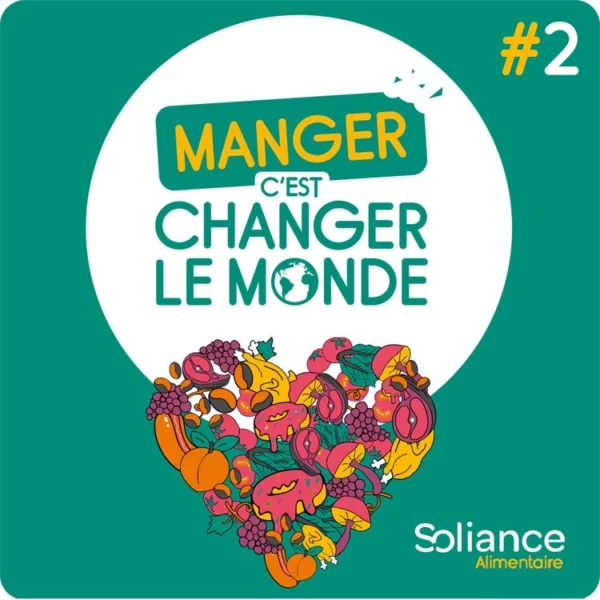Manger, c’est changer le monde, la série de podcasts qui décode les systèmes alimentaires – Épisode 2
Novembre 2022 signe le passage du cap des 8 milliards d’êtres humains sur Terre, ce qui place les questions d’accès à une alimentation durable au cœur des débats. La notion de précarité alimentaire est intimement liée à cette réflexion – en effet, nombreux sont ceux qui, malgré l’existence d’une offre alimentaire durable, ne peuvent y accéder. Ce 2ème épisode de Manger c’est changer le monde accueille Emma Sourisseau, consultante Soliance Alimentaire spécialiste de l’accessibilité alimentaire. C’est à travers un échange de 6 minutes qu’elle nous expose les différents enjeux relatifs à l’insécurité alimentaire.
Précarité alimentaire : définition
D’après la FAO, la précarité alimentaire, ou l‘insécurité alimentaire, est le fait de ne pas avoir accès à « suffisamment d’aliments sains et nutritifs pour une croissance et un développement normaux et une vie active saine »[1]. Cette situation peut être due à l’indisponibilité géographique d’aliments de qualité, ou à un manque de ressource ne permettant pas de s’en procurer. La FAO propose une échelle afin de mesurer le niveau de sécurité alimentaire d’un individu : sécurité alimentaire, insécurité alimentaire légère, insécurité alimentaire modérée et insécurité alimentaire grave. Cet outil, dénommé « échelle de mesure de l’insécurité alimentaire vécue » (FIES), permet d’appréhender concrètement la situation d’individus en situation difficile. Il convient de rappeler ici que l’insécurité alimentaire est un des enjeux de la lutte contre la faim dans le monde.
[1] FAO. (s. d.). La faim et l’insécurité alimentaire. Food and Agriculture Organization of the United Nations. Consulté 15 novembre 2022, à l’adresse http://www.fao.org/hunger/fr/
Le sujet de l’épisode 2 de Manger, c’est changer le monde : comprendre les enjeux liés à la précarité alimentaire
Dans cette épisode de 6 minutes, Emma Sourisseau nous offre une définition claire des enjeux liés à l’insécurité alimentaire et aux défis d’une nourriture saine, quelles que soient les conditions de revenus ou l’implantation géographique d’un individu.
Emma Sourisseau nous fait part d’un constat :
« 2,6 millions de personnes en 2006, 5,5 millions en 2017, et entre 5 et 7 millions en 2020… Ce sont les chiffres saisissants du nombre de personnes ayant recours à l’aide alimentaire en France. D’après le bilan annuel du Secours Catholique paru en 2021 sur l’état de la pauvreté sur le territoire, la crise sanitaire a agi comme révélateur d’une précarité déjà bien ancrée. L’inflation que traverse la France, les conséquences de la période post-COVID et de la guerre en Ukraine… Le contexte nous questionne sur notre résilience alimentaire et pousse malheureusement les plus modestes à réduire la qualité de leur alimentation. Ce moment de notre histoire pourrait pourtant devenir un véritable levier pour transformer notre système alimentaire via des solutions alternatives. »
Transformer notre système alimentaire pour lutter contre la précarité alimentaire
Emma Souriceau nous expose l’intérêt de prendre le virage vers des système alimentaires plus équitables :
« Les régimes alimentaires durables contribuent à protéger et à respecter à la fois la biodiversité et les écosystèmes. Ils sont culturellement acceptables, économiquement équitables, accessibles, abordables, nutritionnellement sûrs et sains. Ils permettent également d’optimiser les ressources naturelles et humaines. Les premières conditions d’accès à ce type d’alimentation sont économiques et physiques. »
Pour elle, il faut néanmoins aller plus loin – elle précise que :
« L’accès à l’alimentation doit comprendre l’adaptation aux besoins nutritionnels et culturels de chacun. On attachera également une importance particulière aux conditions du mode de production de l’alimentation, que l’on soit dans des circuits longs, des circuits courts, de l’agriculture paysanne, biologique ou conventionnelle. La question de la durabilité environnementale, sociale et économique doit se poser quelle que soit la durée de vie du cycle de production. Dans le cadre de la transition vers des systèmes alimentaires plus durables, il faut s’assurer des bonnes conditions d’accès à l’information et à l’éducation sur l’ensemble de ces sujets ».
Lutter contre la précarité alimentaire : de nombreux défis à relever
Repenser la filière pour la rendre accessible au plus grand nombre est donc un enjeu majeur. Néanmoins, comme toute transition, cet effort de changement s’accompagne de problématiques sociales. Ces résistances peuvent représenter un véritable casse-tête pour ce projet d’envergure :
« Oui, les défis à relever autour de la précarité sont nombreux. Néanmoins, la notion d’insuffisance quantitative doit être dépassée pour tendre vers une approche plus qualitative. C’est pourquoi l’alimentation doit être vue comme un vecteur de lien social, d’emploi, de revenu, de relation au monde, de plaisir sensoriel et social. Il s’agit d’un élément de santé, d’identité individuelle et culturelle. »
Pour mieux comprendre la problématique, voici un résumé des enjeux liés à l’insécurité alimentaire :
« Fournir à tous, et en tout temps, un accès économique et matériel à une alimentation de qualité. C’est-à-dire, une alimentation qui réponde aux besoins nutritionnels, culturels et sociaux de chacun. Celle-ci doit également respecter l’environnement et la dignité de tous. »
Pour Emma Souriceau, la solution est claire : « Tous les acteurs de la filière doivent se mobiliser pour transformer notre système alimentaire – à savoir les territoires, les entreprises et les citoyens ».
L’action de Soliance Alimentaire
Grâce à l’expertise d’Emma Sourisseau, spécialiste de l’accessibilité alimentaire, Soliance Alimentaire crée du lien entre producteurs et consommateurs pour faire avancer les choses. Elle nous explique en quoi consiste ces actions :
« Avec Soliance Alimentaire, j’accompagne une association d’aide alimentaire à développer des approvisionnements locaux auprès de producteurs agricoles dans plusieurs départements. L’objectif de cette association est d’acheter des denrées alimentaires de qualité pour mieux répondre aux besoins des personnes qu’elle accueille. Sa mission est aussi de soutenir les producteurs locaux, de créer du lien entre les sphères sociales et agricoles et de réduire l’impact environnemental lié à leur approvisionnement. »
Cet accompagnement fait partie de la raison d’agir de Soliance Alimentaire, à savoir : « accompagner les changements de production, de distribution et de consommation propres aux systèmes agricoles et alimentaires aux bénéfices de la durabilité des ressources, de la bonne santé des entreprises et des consommateurs, le tout dans le respect de l’intégralité de ses parties prenantes. ».
Emma Sourisseau nous explique comment le cabinet porte cette raison d’agir au quotidien :
« Soliance alimentaire s’engage à être un acteur moteur pour permettre l’accès à une alimentation durable pour tous. Notre mission ? Décoder, anticiper, et éclairer les acteurs publics et privés au sujet de modèles émergents, tels que la sécurité sociale de l’alimentation, la démocratie alimentaire ou encore le droit à l’alimentation. Notre cabinet met un point d’honneur à lutter contre la précarité alimentaire grâce à différentes interventions : la structuration des circuits agricoles de proximité, la coordination des acteurs sur le terrain et le diagnostic de l’insécurité alimentaire. Ce dernier implique l’évaluation de 5 domaines précis : la précarité économique, la vulnérabilité des populations, le recensement de l’aide alimentaire, de l’offre disponible et la santé. Nous déployons ces sujets au sein de nos projets alimentaires territoriaux (PAT). C’est notamment le cas de l’action que nous menons dans le Vaucluse, en lien avec le département qui mets en œuvre un PAT à vocation sociale et éducative. »
Oui, nourrir 8 milliards d’êtres humains de manière équitable, respectueuse de leur santé, de leurs besoins et de leur culture représente un des plus grands défis à venir pour notre société. Comme a pu nous le montrer Emma Sourisseau à travers cette épisode de Manger, c’est changer le monde, des solutions existent et nombreux sont ceux qui se structurent déjà pour les faire émerger.
Vous avez aimé ce contenu ? Rendez-vous le mois prochain pour un nouvel épisode de Manger, c’est changer le monde.
En attendant, n’hésitez pas à partager cet épisode autour de vous, mais également à donner vos avis sur notre série de podcasts.
Pour patienter, écoutez un autre épisode de Manger c’est changer le monde :




